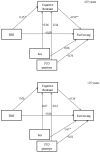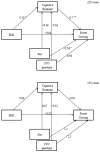Eating Behaviours and Food Cravings; Influence of Age, Sex, BMI and FTO Genotype
- PMID: 30759834
- PMCID: PMC6412354
- DOI: 10.3390/nu11020377
Eating Behaviours and Food Cravings; Influence of Age, Sex, BMI and FTO Genotype
Abstract
Previous studies indicate that eating behaviours and food cravings are associated with increased BMI and obesity. However, the interaction between these behaviours and other variables such as age, sex, BMI and genetics is complex. This study aimed to investigate the relationships between eating behaviours and food cravings, and to examine the influence of age, sex, body mass index (BMI) and fat mass and obesity-associated (FTO) genotype on these relationships. A total of 475 participants (252 female, 223 male, BMI: 25.82 ± 6.14 kg/m², age: 30.65 ± 14.20 years) completed the revised 18-question version of the Three Factor Eating Questionnaire (TFEQ-R18) to assess cognitive restraint, uncontrolled eating and emotional eating, and the Food Cravings Inventory (FCI) to assess cravings for fatty food, sweet food, carbohydrates and fast food. DNA samples were genotyped for the rs9939609 polymorphism in the obesity-linked gene FTO. Questionnaire data was analysed for associations between the TFEQ-R18 and FCI subscales for the whole study group, and the group divided by sex, genotype and age (≤25 years versus >25 years). Finally, mediation analysis was used to explore the relationships between BMI, cognitive restraint and food cravings. FTO AA + AT genotype was associated with increased BMI, but not with differences in eating behavior scores or food craving scores; age was associated with increased BMI and decreases in food craving scores in which this effect was stronger in women compared to men. Increased cognitive restraint was associated with decreased food craving scores in the ≤25 years group. Mediation analysis demonstrated that in this group the association between BMI and reduced food cravings was mediated by cognitive restraint indicating that in this age group individuals use cognitive restraint to control their food cravings. The positive correlation between age and BMI confirms previous results but the findings of this study show that age, sex, FTO genotype and BMI have an influence on the relationships between eating behaviours and food cravings and that these variables interact.
Keywords: body mass index; cognitive restraint; eating behavior; emotional eating; food craving; uncontrolled eating; weight gain; weight loss.
Conflict of interest statement
The authors declare no conflict of interest.
Figures


Similar articles
-
FTO affects food cravings and interacts with age to influence age-related decline in food cravings.Physiol Behav. 2018 Aug 1;192:188-193. doi: 10.1016/j.physbeh.2017.12.013. Epub 2017 Dec 9. Physiol Behav. 2018. PMID: 29233619 Free PMC article.
-
The influence of restrained and external eating patterns on overeating.Appetite. 2007 Jul;49(1):191-7. doi: 10.1016/j.appet.2007.01.007. Epub 2007 Feb 11. Appetite. 2007. PMID: 17349717
-
Do scores on the Food Craving Inventory and Three-Factor Eating Questionnaire correlate with expected brain regions of interest in people with obesity?Physiol Behav. 2018 May 1;188:1-10. doi: 10.1016/j.physbeh.2018.01.018. Epub 2018 Feb 3. Physiol Behav. 2018. PMID: 29421336
-
Reward-Induced Eating: Therapeutic Approaches to Addressing Food Cravings.Adv Ther. 2016 Nov;33(11):1853-1866. doi: 10.1007/s12325-016-0414-6. Epub 2016 Oct 7. Adv Ther. 2016. PMID: 27718159 Free PMC article. Review.
-
Food cravings and body weight: a conditioning response.Curr Opin Endocrinol Diabetes Obes. 2018 Oct;25(5):298-302. doi: 10.1097/MED.0000000000000434. Curr Opin Endocrinol Diabetes Obes. 2018. PMID: 30048258 Free PMC article. Review.
Cited by
-
The Relationship between Restrained Eating, Body Image, and Dietary Intake among University Students in China: A Cross-Sectional Study.Nutrients. 2021 Mar 19;13(3):990. doi: 10.3390/nu13030990. Nutrients. 2021. PMID: 33808609 Free PMC article.
-
Genetic association of FTO gene polymorphisms with obesity and its related phenotypes: A case-control study.J Cardiovasc Thorac Res. 2024;16(2):102-112. doi: 10.34172/jcvtr.33038. Epub 2024 Jun 25. J Cardiovasc Thorac Res. 2024. PMID: 39253342 Free PMC article.
-
Association between personality traits, eating behaviors, and the genetic polymorphisms FTO-rs9939609 and MAO-A 30 bp u-VNTR with obesity in Mexican Mayan children.Front Genet. 2024 Jul 26;15:1421870. doi: 10.3389/fgene.2024.1421870. eCollection 2024. Front Genet. 2024. PMID: 39130748 Free PMC article.
-
The association between anxiety sensitivity and food cravings among individuals seeking treatment for weight-related behaviors.Eat Behav. 2023 Jan;48:101684. doi: 10.1016/j.eatbeh.2022.101684. Epub 2022 Nov 23. Eat Behav. 2023. PMID: 36463666 Free PMC article.
-
The FTO gene polymorphism rs9939609 is associated with obesity and disability in multiple sclerosis patients.Sci Rep. 2019 Dec 13;9(1):19071. doi: 10.1038/s41598-019-55742-2. Sci Rep. 2019. PMID: 31836807 Free PMC article.
References
-
- World Health Organization . Obesity and Overweight. Volume 311 World Health Organization; Geneva, Switzerland: 2016. Fact Sheet.
MeSH terms
Substances
Grants and funding
LinkOut - more resources
Full Text Sources
Medical

